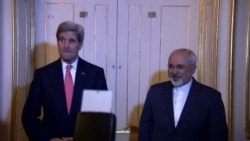The United States and its allies will make another attempt this week to reach an agreement with Iran that prevents it from developing nuclear weapons in exchange for the lifting of international sanctions, but sealing such a deal isn't likely to be easy, some experts say.
U.S. Secretary of State John Kerry will meet with his Iranian counterpart, Foreign Minister Mohammed Javad Zarif, on Wednesday in Geneva to discuss the negotiations between Tehran and the P5+1 group — the United States, Britain, China, France, Russia and Germany — which will resume in the Swiss city later in the week.
Middle East expert James Phillips of the Heritage Foundation said that "at best," the P5+1 group could get "a great extension of the time needed for Iran to stage a nuclear breakout. But it won’t be able to get guarantees that there will be no breakout."
Iran says its nuclear program is solely for peaceful purposes. The United States and its allies do not believe this claim and have slapped economic sanctions on Iran that experts say are seriously hurting the country’s economy.
"Oil exports from Iran have been cut roughly from 2.5 million to 1 million barrels a day," said Allen Keiswetter of Washington’s Middle East Institute. "Furthermore, the price of oil has now dropped by about 50 percent. So, you are looking at Iran receiving 20 to 25 percent of the revenues that it did previously."
Tehran's uranium enrichment capacity and the speed at which economic sanctions should be lifted are reported to be the major outstanding differences between the two sides. Iran may be trying to use the negotiations to ease the economic sanctions without giving up much of its nuclear capability, according to Phillips.
"Iran wants to wriggle out of sanctions without foreclosing its nuclear options," he said. "That is, it wants to weaken sanctions as much as possible but it doesn’t want to definitively give up its nuclear option. And unfortunately, that won’t work for the U.S."
But other experts are more optimistic about the prospects for agreement, saying both sides stand to gain a lot if they succeed.
"We are very eager to stop all the routes for Iran to obtain a nuclear weapon, and this would be a big, big victory," Keiswetter said. "On the Iranian side, it could lift the sanctions and open up routes for Iran to reintegrate into the world economy."
Both Iran and the United States have expressed hope they will make progress at the upcoming talks. However, they may not agree with each other’s version of what the progress may look like.





